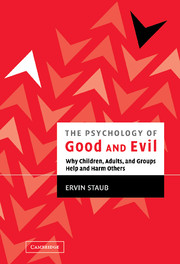Book contents
- Frontmatter
- Contents
- Preface
- Acknowledgments
- PART I INTRODUCTION AND CORE CONCEPTS
- PART II THE ROOTS OF HELPING OTHER PEOPLE IN NEED IN CONTRAST TO PASSIVITY
- PART III HOW CHILDREN BECOME CARING AND HELPFUL RATHER THAN HOSTILE AND AGGRESSIVE
- PART IV THE ORIGINS OF GENOCIDE, MASS KILLING, AND OTHER COLLECTIVE VIOLENCE
- PART V THE AFTERMATH OF MASS VIOLENCE: TRAUMA, HEALING, PREVENTION, AND RECONCILIATION
- 33 Preventing Group Violence
- 34 Kosovo: The Need for Flexible Bystander Response
- 35 The Effects of Violence on Groups and Their Members
- 36 Healing, Reconciliation, and Forgiving after Genocide and Other Collective Violence
- 37 Healing, Forgiveness, and Reconciliation in Rwanda: Project Summary and Outcome, with Addendum on Other Projects
- 38 Further Avenues to Prevention
- 39 Commentary: Human Destructiveness and the Refugee Experience
- 40 A Vision of Holocaust Education in Holocaust Centers and Schools
- 41 Out of Hiding
- 42 Review of Legacy of Silence: Encounters with Children of the Third Reich
- 43 What Can We Learn from This Tragedy? A Reaction Days after September 11, 2001
- PART VI CREATING CARING, MORALLY INCLUSIVE, PEACEFUL SOCIETIES
- Appendix: What Are Your Values and Goals?
- Index
39 - Commentary: Human Destructiveness and the Refugee Experience
Published online by Cambridge University Press: 07 May 2010
- Frontmatter
- Contents
- Preface
- Acknowledgments
- PART I INTRODUCTION AND CORE CONCEPTS
- PART II THE ROOTS OF HELPING OTHER PEOPLE IN NEED IN CONTRAST TO PASSIVITY
- PART III HOW CHILDREN BECOME CARING AND HELPFUL RATHER THAN HOSTILE AND AGGRESSIVE
- PART IV THE ORIGINS OF GENOCIDE, MASS KILLING, AND OTHER COLLECTIVE VIOLENCE
- PART V THE AFTERMATH OF MASS VIOLENCE: TRAUMA, HEALING, PREVENTION, AND RECONCILIATION
- 33 Preventing Group Violence
- 34 Kosovo: The Need for Flexible Bystander Response
- 35 The Effects of Violence on Groups and Their Members
- 36 Healing, Reconciliation, and Forgiving after Genocide and Other Collective Violence
- 37 Healing, Forgiveness, and Reconciliation in Rwanda: Project Summary and Outcome, with Addendum on Other Projects
- 38 Further Avenues to Prevention
- 39 Commentary: Human Destructiveness and the Refugee Experience
- 40 A Vision of Holocaust Education in Holocaust Centers and Schools
- 41 Out of Hiding
- 42 Review of Legacy of Silence: Encounters with Children of the Third Reich
- 43 What Can We Learn from This Tragedy? A Reaction Days after September 11, 2001
- PART VI CREATING CARING, MORALLY INCLUSIVE, PEACEFUL SOCIETIES
- Appendix: What Are Your Values and Goals?
- Index
Summary
I was in the midst of writing The Roots of Evil: The Psychological and Cultural Origins of Genocide and had finished an analysis of the “autogenocide” in Cambodia, when I was invited to attend a meeting of the seminar on Southeast Asia in which students wrote essays about their life experiences. I heard one student describe in personal terms the horrors in Cambodia that I knew so well from my research. But the tragedy of students from other Southeast Asian countries was also manifest in this meeting: young people, children and adolescents, fearing for their lives or in the hope of greater security and human dignity left their countries, alone or with their families.
Being a refugee is a tragically common human experience. Unfortunately, repression and violence that lead people to escape from their own country and seek refuge elsewhere have always existed. It is all too frequent in our century. Huge numbers of people were displaced and became stateless in Europe during the first part of the century. Millions of people became refugees in the wake of the Second World War. But this saga seems never ending, and the flow of those seeking refuge continues.
creating refugees: the origins of repression, torture, mass killings
A group of young Cambodian students in Paris, all members of the French Communist party, comrades in Communist study groups, became political associates and, ultimately, associates in designing a vision of a society that they attempted to fulfill by genocide.
- Type
- Chapter
- Information
- The Psychology of Good and EvilWhy Children, Adults, and Groups Help and Harm Others, pp. 460 - 463Publisher: Cambridge University PressPrint publication year: 2003



